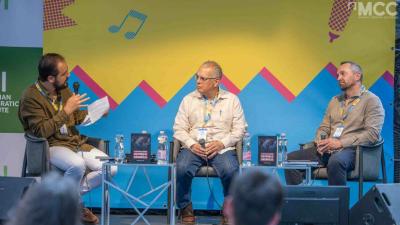“There is much more that unites Spain and Hispanic America than what differentiates us”: An Interview with Manuel Fuentes Márquez
In the television programme El mejor de la historia, broadcast by La 1 of Radiotelevisión Española, Hernán Cortés is described by one of the participants as an “animal” and an “impressive murderer”. The black legend is widespread in Spain, and Hernán Cortés, like other conquistadors, is portrayed in a very negative light. To discuss his historical relevance and the many myths that surround him, I spoke to Manuel Fuentes Márquez, a historian, researcher, and author of the Spanish history website Libros y Lanzas. He is also a secondary school teacher, and he collaborates with various history-oriented platforms and publications.
Álvaro Peñas: TV and film reiterates that wealth was the only desire of the conquistadors. The same thing has happened with Hernán Cortés. But the reality is that gold is not what motivated him to undertake the conquest of Mexico.
Manuel Fuentes Márquez: America was one of the two options available to the hidalgos — minor nobles — to obtain land and vassals, which was what gave prestige at that time. The other option was to fight in the campaigns in Italy, or later in Europe. But most Spaniards who went to America had no economic problems. In Cortés’ case, he could have stayed on his parents’ hacienda as he was an only child, but young men of this era had a thirst for adventure that pushed them to leave their homes and take risks. Once in Cuba, Cortés becomes the richest man on the island and has no need to undertake such a dangerous adventure. What makes him do it? Honour and posterity. We forget that the readings of that time were Amadis de Gaula, the novels of chivalry, the histories of ancient Greece and Rome. Young men tried to imitate the great heroes like Alexander the Great or Julius Caesar, and war was a man’s trade and the noblest profession.
As is often the case, these statements are made with the mentality of modern man in mind.
That’s right. Cortés managed to make a fortune with cattle in Cuba and was what we would call today an entrepreneur. Many were not so lucky or successful. Another widespread myth is that all the conquistadors got rich, but this was only true of the captains and those who financed the enterprise, which was a private enterprise. Most soldiers went into debt to obtain arms, gunpowder, and supplies, and often did not benefit financially from the adventure.
You mentioned the chivalric ideal, but what about the religious component?
It is fundamental, and it is undeniable that the cross went hand in hand with the sword. First, because the conquest of America was legitimised by the Bulls of Alexandria, i.e. the conquest was not legally possible without the Pope’s approval. They were unexplored lands and the legitimacy over them was in the hands of God, therefore, his vicar on Earth was the only one authorised to grant permission for the conquest. Moreover, it was considered wrong to conquer without an evangelising purpose, and this is evidenced by the judgements of residence. Royal officials, once their service was over, were subjected to these trials by the Crown, and great emphasis was placed on whether Christian standards had been met.
The Spaniards came from centuries of fighting against the infidel and used the concept of “just war” in defence of the true religion, but, at the same time, they understood that they were fighting against pagans, not infidels, so the Church was striving for their salvation, which is why evangelisation went hand in hand with conquest.
After the Battle of Grijalva River, first Spanish victory on the continent, several slaves were handed to the Spaniards. One of them, Doña Marina, served as a translator for Cortés and was a key player in the conquest. Today she is branded a traitor.
Yes, but in reality she is a survivor. She is the daughter of a cacique who was made a slave by her mother, who married another tribal leader after her father’s death. She was christened Marina, and Cortés saw in her a woman who could help him understand the Aztec world, and who spoke Nahuatl and Mayan. The expedition included Jerónimo de Aguilar, a shipwrecked sailor rescued by Cortés who spoke Mayan but did not understand the language of the Mexica. So Marina translated from Nahuatl to Mayan, and Jerónimo translated from Mayan to Spanish.
But her role is even more important because she teaches Cortés what the Aztec world is like. It must be understood that they were two completely different worlds and the arrival of the Spaniards breaks centuries of isolation. Marina adapts to the new Spanish reality in order to survive in the best possible way. She was also a very brave woman and the Spaniards treated her as one of their own. The chronicler Bernal Diaz del Castillo spoke of her as a “strenuous male”, which was not just comparing her to a man, but to a warrior.
When analysing the past, some people make the mistake of wanting to do so according to present-day ideas or values. However, what would a modern man do if he found a world in which the walls of temples were covered with blood, there were towers of skulls, and the priests wore human skins?
Surely a modern man would think nothing of ‘understanding cultural differences’, and would instead run away in terror. The culture clash that occurred then was brutal, because the Spaniards came from a Catholic society and the religion of Mesoamerica was terribly cruel. At a time when the salvation of souls was what mattered for the Spaniards, because death was the order of the day, what was happening in Mesoamerica was inconceivable. We are talking about a civilisation that, when it was not raining, sacrificed newborn children, giving to the god Tlaloc the most tender and precious thing they had. The Spaniards could not accept such barbarism.
Technological superiority is another myth that has been offered to explain what Cortés achieved.
Technological superiority is a factor, but it is not the determining one. The Spaniards became the best elite force of any army in Mesoamerica. Armour gave an advantage, but not everyone wore armour, let alone full armour, which was impossible in the heat unless you were on horseback. Then there were the firearms, which were also not decisive because their effect was mainly psychological. And then there were horses, which the Spaniards used in cavalry charge — something the Aztecs had never faced before and which wreaked havoc — but they only had 16 of them.
Almost more important is the different way of waging war, because the Aztecs sought to take prisoners.
Yes, because for the Aztecs, prestige was not in killing enemy warriors, but in taking them prisoner and then sacrificing and eating them. This ritual anthropophagy was very important for climbing the social ladder. Logically, this allowed many Spaniards to escape their rivals and continue fighting.
The most decisive factor, however, was the help of the natives. Spain conquered the Aztec empire with the help of the natives and, centuries later, the Spaniards gained independence against the will of the natives. Going back to Cortés, it would have been impossible for the Spaniards to take these vast territories without the logistical and military support of many peoples who were subjugated by the Aztecs. The Aztec empire was at the zenith of an expansion that had been too rapid, so the loyalty of the subjugated peoples was very weak. Cortés took advantage of this situation to become the liberator of all these peoples.
So, he proves to be a great strategist.
He was a brilliant strategist in Mexico, but in his later ventures he was unlucky. One of the keys to his success was that he was able to surround himself with the best captains and adapt to an unfamiliar territory and culture. He used force and diplomacy as he saw fit and demonstrated a patrimonial and humanistic worldview. In military terms, the capture of Mexico-Tenochtitlan, the Aztec capital, is an amphibious operation that can be compared to any capture of a city in modern warfare, such as the sieges of Saragossa, Stalingrad, or (right now) Gaza, where the Israeli army has to advance metre by metre, destroying buildings.
But Cortés is also trying to integrate with the territory he has just conquered. He has fulfilled every nobleman’s dream of gaining land and vassals, and he identifies with the new territory, so he tries to evangelise them and establish ordinances to avoid what he had seen in the West Indies, where disease and ill-treatment had decimated the natives.
With this identification with the territory and the ordinances, did Cortés become the founder of Mexico?
Yes, he is the one who will give it its first administrative form. From the very first moment, he tried to rebuild Mexico-Tenochtitlan and to re-found a new city on its ashes: the city of Mexico. And for a city to have life, there must be citizens to live and work in it. One of his first policies was to reconcentrate in the city the population that had fled as a result of the war, and subsequently to reintegrate them. To this end, he connected the families of the Aztec nobility with the conquistadors. In fact, he had a son with a daughter of Moctezuma, and he tries to maintain these ties. The best proof of this fact is that a grandson of Montezuma has his palace in Cáceres.
On the other hand, Cortés was concerned with the other factor that at that time gave uniformity to a territory: religion. To achieve evangelisation, Cortés brought Franciscan missionaries to Mexico. This is when Fray Pedro de Gante (a relative of Emperor Charles I), Motolinia, and Juan de Zumarraga arrived, all very important men who marked a ‘before’ and ‘after’ in Mexico. For example, Pedro de Gante was the founder of the first school for natives — sons of the Aztec nobility — the school of Tlatelolco.
Why do you think that a ‘black legend’ of this conquest is still so widespread in both Spanish America and Spain?
In a conquest there is always death and terror, as the Aztecs had also perpetrated, but later the population became integrated and a New Spain developed that would be much richer than Spain itself. That is why it is a mistake for Mexico to try to trace its roots back to the Aztec empire, forgetting many other peoples such as the Tarascans, Zempoaltecs, or Tlaxcalans. It is a political perspective in which nationalism and history are invented to manipulate others, especially when the Aztecs are presented as humble and poor, when they were actually an empire that enslaved many peoples. This indigenism has become a tremendous source of votes and popular support, and plays with absolute Manichaeism. It is the myth of the good savage who lived in paradise until the Spaniards came to wipe them out, and it is basically a problem of education.
In Spain, it is time to get rid of our shame and self-consciousness. If they come to demand our forgiveness and we do so, we are reaffirming this lie. In history we have to work with documents, which together with archaeology is the only evidence that really remains, and the rest is invention. We would gain a lot if we understood that there is much more that unites Spain and Hispanic America than what differentiates us, but political interests play against history.
Article originally published in The European Conservative “There is much more that unites Spain and Hispanic America than what differentiates us.”: An Interview with Manuel Fuentes Márquez ━ The European Conservative
Read also
“Chechnya lives under a regime of terror where dissent is not allowed”: An interview with Marta Ter Ferrer
In Chechnya there is such absolute control that opposition is impossible. Criticising Kadyrov can result in a beating, public humiliation or even having your relatives’ house burned down.
Álvaro Peñas
Manuel Veiga Aldemira: "Technology gives a second life to many Ukrainians, some soldiers have even returned to the front"
Manuel Veiga Aldemira: I have been involved in supporting Ukraine since February last year, from the very beginning of the invasion.
Álvaro Peñas
Alejandro Peña Esclusa: “We must create a mass movement capable of defeating cultural Marxism”
In my previous article, “That wonderful feeling of normality”, I commented on the enormous variety of debates organised by the Mathias Corvinus Collegium.
Álvaro Peñas
Country Report: Spain, June 2023 - Right-wing coalition government closer than ever before
The regional and local elections of 28 May marked a change of course in Spanish politics














Comments (0)